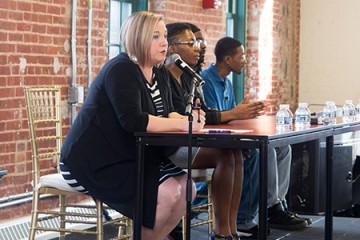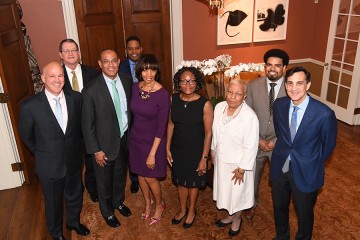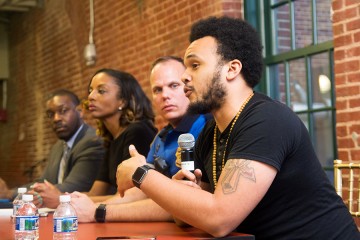The role and responsibility of Johns Hopkins in shaping its home city of Baltimore was a frequent topic of conversation Wednesday afternoon at CityLab Baltimore, a high-profile brainstorming session on urban solutions.
In a conversation on vacant buildings, one Baltimore official pointed the crowd's attention to the historic structure in which they were gathered—the Parkway Theatre, a recently restored movie palace in the Station North neighborhood—as an example of the university's leverage in the city.
Johns Hopkins helped attract investment from the international Stavros Niarchos Foundation to renovate the long-abandoned building, noted Michael Braverman, director of the Baltimore City Department of Housing and Community Development. He pointed also to the surrounding North Avenue corridor as an area where Hopkins has lent "their capital, their teams" to turn over vacancies and spur revitalization.
The CityLab event focused not just on Baltimore but other U.S. cities with similar challenges and demographics, including Detroit; New Orleans; and Albany, New York. Among the topics of conversation—city leaders shared strategies for blight and urban renewal, public health experts probed the opioid crisis, and artists discussed community-grown projects in Baltimore.
The roster was dotted with experts from Johns Hopkins, along with alumni—including Braverman, Baltimore writer D. Watkins, and philanthropist and former three-term New York City Mayor Michael Bloomberg.
Bloomberg opened the event by framing U.S. cities as engines of innovation, the true change-makers in the face of federal dysfunction.
"Cities are really where the action takes place," he said, emphasizing that mayors in particular "can help cut the red tape," while private partners can "help tackle some of the biggest challenges we have."
Baltimore Mayor Catherine Pugh named Johns Hopkins as one anchor institution helping the city "change its narrative" by drawing and retaining fresh talent. She noted, for example, the university's Live Near Your Work program, which has encouraged homeownership in the Eager Park neighborhood.
Two public health experts from Johns Hopkins—Michael Botticelli and Josh Sharfstein—helped steer the conversation on how cities are battling the opioid crisis. The topic was particularly timely, coming a day after a bipartisan commission urged President Donald Trump to declare the epidemic a national emergency.
The panel, which also included Baltimore City Health Commissioner Leana Wen, explored the aggressive rise of fentanyl, the proven value of naloxone as an overdose antidote, and some stigmas and misconceptions that hinder addiction treatment.
Sharfstein described testing approaches "that are a little edgy" under the Bloomberg American Health Initiative, including supervised drug consumption areas.
Botticelli, the former Obama administration drug czar who joined Hopkins in June as a Distinguished Policy Scholar, cut through the stigmas by candidly referencing his own "long-term recovery." He criticized "an over-reliance on punitive approaches" for dealing with the known "disease" of addiction.
In a panel on neighborhood revitalization strategies, Braverman spoke of the "organic relationship" between his housing department and Johns Hopkins researchers. In one case, he said, "JHU provided us scientists, literally astrophysicists" to develop, "parcel by parcel," data on the city's housing stock.
The CityLab Baltimore event was sponsored by The Atlantic, The Aspen Institute, and Bloomberg Philanthropies. Full sessions videos are available on The Atlantic's website.
The program came shortly after an announcement by Bloomberg Philanthropies and Goldman Sachs of a $10 million commitment to nurturing small businesses in Baltimore. Johns Hopkins will serve as a host site for that program, Goldman Sachs 10,000 Small Businesses, after helping to steer two special sessions of the program over the past six months.
Posted in University News, Politics+Society
Tagged baltimore, joshua sharfstein, urban policy










